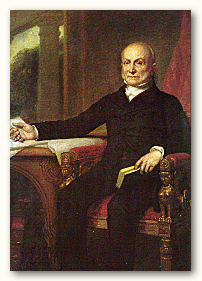As I stated in a previous post, July 2 was the day independence passed in the Continental Congress. It was important, though, to come up with a statement that declared to the world the reasons for the decision. That statement, initially called “A Declaration by the Representatives of the United States of America in General Congress Assembled,” is the document we now simply entitle “The Declaration of Independence.”
Since it was approved on July 4, 1776, people began to celebrate that day rather than July 2. As the years progressed, the commemoration of that event became firmly established as the premier national holiday. Ceremonies were held in every village and hamlet. At the larger ceremonies, orators could practice their skill. Fourth of July orations became staples of the day.
 John Quincy Adams spoke at numerous Fourth of July celebrations and had some interesting things to say. For instance, in 1821, he said,
John Quincy Adams spoke at numerous Fourth of July celebrations and had some interesting things to say. For instance, in 1821, he said,
The highest glory of the American Revolution was this; it connected in one indissoluble bond the principles of civil government with the principles of Christianity. From the day of the Declaration . . . they [the American people] were bound by the laws of God, which they all, and by the laws of The Gospel, which they nearly all, acknowledge as the rules of their conduct.
Again, in 1837, he pronounced the following:
Why is it that, next to the birthday of the Savior of the World, your most joyous and venerated festival returns on this day? Is it not that, in the chain of human events, the birthday of the nation is indissolubly linked with the birthday of the Savior? That it forms a leading event in the Progress of the Gospel dispensation? . . . That it laid the cornerstone of human government upon the first precepts of Christianity?
During John Quincy Adams’s presidency, in 1826, the nation prepared to remember the Declaration in a special way since that year marked the 50th anniversary of the document. Thomas Jefferson, in Virginia, and John Adams, in Massachusetts, were called upon to attend special commemorations on that day since they were the principal members of that Continental Congress responsible for the Declaration. Both had to decline those invitations due to health. Only later did the nation discover the strange events of July 4, 1826. John Adams died on that day, but one of his last lucid sentences was “Thomas Jefferson survives.” Little did he know that Jefferson had expired earlier on the same day.
When this unusual occurrence became known, the nation marveled that the two men who had made the Declaration possible would happen to die together on its 50th anniversary. Adams’s son, John Quincy, remarked,
A coincidence of circumstances so wonderful gives confidence to the belief that the patriotic efforts of these illustrious men were Heaven directed, and furnishes a new seal to the hope that the prosperity of these States is under the special protection of a kind Providence.
Truly a Fourth of July to remember.
